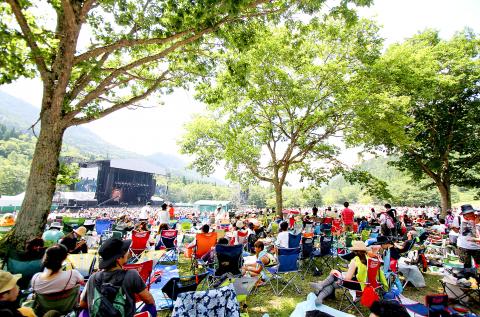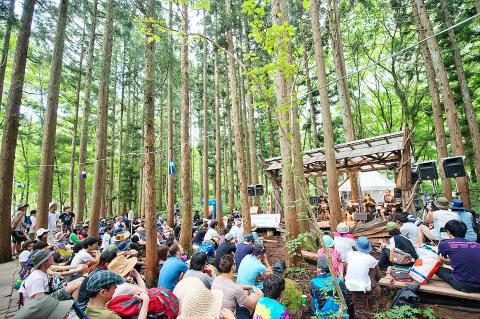With the northern hemisphere’s summer music festival season now in full swing, social media feeds worldwide are bursting with images and videos of joyful revelers. Yet many Taiwanese and Taiwan-based expats, having caught the festival bug in Europe or North America, find their local choices limited by the island’s peripheral location in the global music scene.
While events like Spring Scream (春天吶喊) and the Ho-Hai-Yan Gongliao Rock Festival provide impressive platforms to showcase local music talent, the lack of touring international artists in the line-ups shows no sign of changing soon.
This is due to the recent explosion in festival events worldwide, leading to a demand for live music acts that cannot be met by supply. Big name bands inevitably opt for the events that mesh most seamlessly with their summer schedules, as well as those that give them the most exposure to their fans. In this context, would-be festival organizers in Taiwan struggle to compete.

Photo courtesy of Masanori Naruse
As a result, Taiwan’s international music disciples are forced to look elsewhere for their festival fixes, and recent years have seen a discernible increase in Taiwanese attendees at Clockenflap in Hong Kong and Summer Sonic in Tokyo, amongst others. Yet the festival that arguably wins the popularity stakes among Taiwan’s own ‘music tourists’ is Fuji Rock Festival, which takes place this weekend.
FUJI ROCKS
Fuji Rock Festival began in 1997 at the base of the Japan’s most recognizable mountain, but since 1999 it has been held in the beautiful wooded valley that in winter becomes Naeba Ski Resort. Despite a slight weakening in the big-name factor of its lineup over recent years, the event still remains Asia’s largest both in terms of scale and attendees with upwards of 100,000 fans making the trek every year.

Photo courtesy of Tsuyoshi Ikegami
For a regular Fuji-goer like Baggio Hung (洪揚), who has attended the event every year since 2014, it was the event’s unique mountain location and history as Asia’s oldest outdoor music festival that initially appealed to him.
“It’s difficult to replicate the cultural aspects of the event that are unique to Japan,” he says, and he is downbeat about the potential for a festival in Taiwan to achieve anything comparable, citing a “lack of suitable venues” and “weak support from the government” as the key reasons.
MORE THAN THE MUSIC

Photo courtesy of Uchutaishi Star
Jersey Yen (顏芯樂), who has clocked up an impressive 10 years in a row at Fuji Rock, believes that the things attracting Taiwanese music-lovers to the festival in increasing numbers have less to do with the lineup and more to do with Fuji Rock’s reputation for eco-friendliness.
“There’s a big focus at Fuji Rock on recycling, sustainability, and renewable energy,” she says, “and even workshops encouraging discussion about nuclear power. These things all make the event much richer than a simple music festival experience.”
Ken Huang (黃元成), a Taiwanese film producer who hasn’t missed a year since 2006, echoes Yen’s sentiments. “Fuji Rock is about much more than music; it’s the nature, it’s the art and it’s the festival’s approach towards the environment,” he says. “I’ve made so many friends, from Japanese music fans to one of the guys who operates a ramen stand. I decided from the first time I went that I’d be back every year…not least to eat my friend’s ramen.”

Photo courtesy of Masanori Naruse
Fuji Rock’s seven main stages mean that there’s plenty of room for the underground and obscure.
Taiwanese acts are no strangers to the event either, and local metal band Chthonic, whose lead vocalist Freddy Lim is now a legislator for the New Power Party, are perhaps the biggest Taiwanese band to have performed at Fuji Rock to date.
Yet while huge international acts like Bjork, The XX, and Gorillaz will be drawing in the crowds over the weekend, the biggest star might be the festival itself.

The canonical shot of an East Asian city is a night skyline studded with towering apartment and office buildings, bright with neon and plastic signage, a landscape of energy and modernity. Another classic image is the same city seen from above, in which identical apartment towers march across the city, spilling out over nearby geography, like stylized soldiers colonizing new territory in a board game. Densely populated dynamic conurbations of money, technological innovation and convenience, it is hard to see the cities of East Asia as what they truly are: necropolises. Why is this? The East Asian development model, with

June 16 to June 22 The following flyer appeared on the streets of Hsinchu on June 12, 1895: “Taipei has already fallen to the Japanese barbarians, who have brought great misery to our land and people. We heard that the Japanese occupiers will tax our gardens, our houses, our bodies, and even our chickens, dogs, cows and pigs. They wear their hair wild, carve their teeth, tattoo their foreheads, wear strange clothes and speak a strange language. How can we be ruled by such people?” Posted by civilian militia leader Wu Tang-hsing (吳湯興), it was a call to arms to retake

This is a deeply unsettling period in Taiwan. Uncertainties are everywhere while everyone waits for a small army of other shoes to drop on nearly every front. During challenging times, interesting political changes can happen, yet all three major political parties are beset with scandals, strife and self-inflicted wounds. As the ruling party, the Democratic Progressive Party (DPP) is held accountable for not only the challenges to the party, but also the nation. Taiwan is geopolitically and economically under threat. Domestically, the administration is under siege by the opposition-controlled legislature and growing discontent with what opponents characterize as arrogant, autocratic

When Lisa, 20, laces into her ultra-high heels for her shift at a strip club in Ukraine’s Kharkiv, she knows that aside from dancing, she will have to comfort traumatized soldiers. Since Russia’s 2022 invasion, exhausted troops are the main clientele of the Flash Dancers club in the center of the northeastern city, just 20 kilometers from Russian forces. For some customers, it provides an “escape” from the war, said Valerya Zavatska — a 25-year-old law graduate who runs the club with her mother, an ex-dancer. But many are not there just for the show. They “want to talk about what hurts,” she